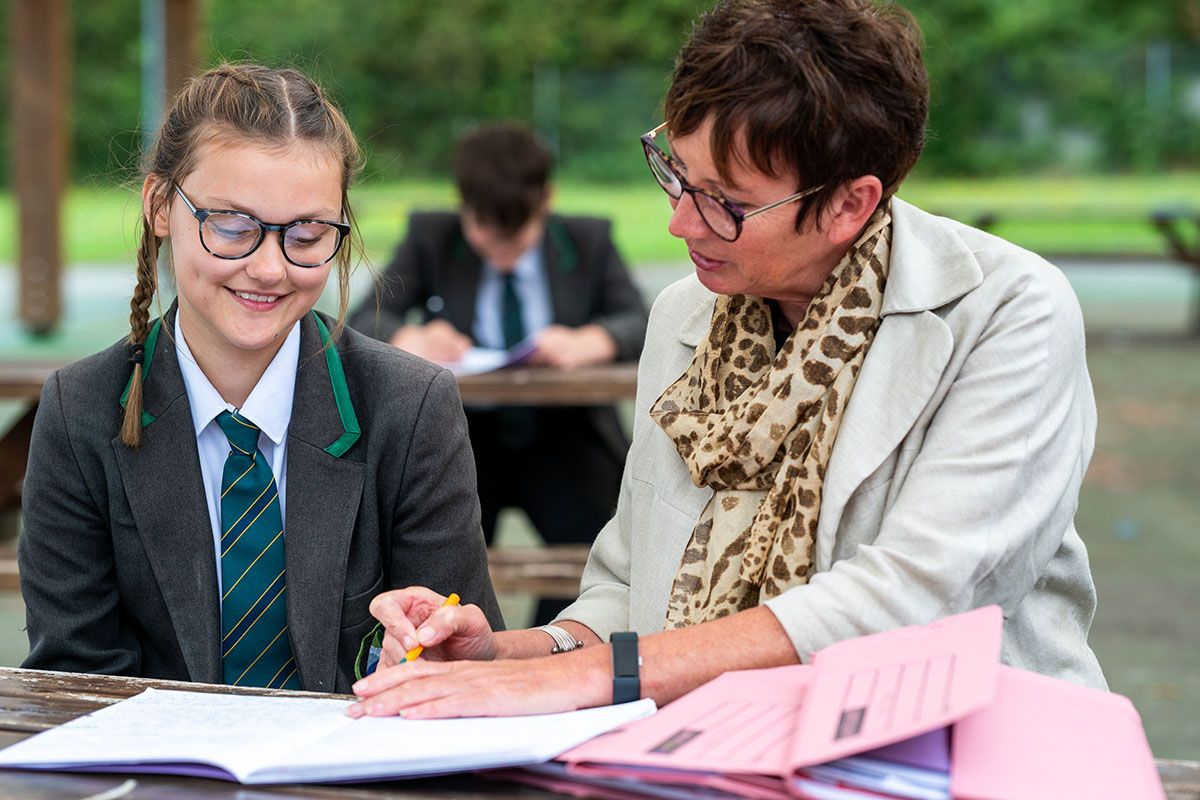Languages

Languages
Curriculum Overview
Intent: Our Purpose and Ambition
“Language shapes the way we think, and determines what we can think about” – Benjamin Lee Whorf
“He who knows no foreign languages, knows nothing of his own” – Johann Wolfgang von Goethe
The intent of the MFL department, currently incorporating French, Spanish and Chinese across the Federation, is that all our language learners aspire to belong to a multicultural and mutually respectful society. We seek to ensure that all our students acquire the educational and cultural capital to which all young people are entitled. It is our intent to ensure that our curriculum, is informed by leading research and is both challenging and inspiring for all students. Our students build their skills, knowledge and understanding from units of sound, up to words, sentences and paragraphs with the aim of becoming competent and confident linguists.
What do we expect students to get from Languages?
We want our pupils to have a love of languages and an openness to other cultures and to ensure they realise the plethora of possibilities and opportunities that studying foreign languages can bring. Students will build resilience, communication and problem-solving skills that will be easily transferable to other curriculum areas as well as the world of work.
Implmentation: Design, Pedagogy and Assessment
How does learning develop over the five years?
Year 7: Myself, My Life & My Home
The Year 7 MFL curriculum is evolving to meet national best practice, led by NCELP (National Centre for Excellence in Languages Pedagogy) with a clear focus on key phonics – the building blocks of words – so that students can move efficiently onto building words and sentences and increase their involvement in communication about themselves, their school, where they live, their home, their free time and food and drink. They will be able to give and understand opinions about a range of these topics and they will have built up knowledge and understanding of approximately 360 out of the 2000 most commonly used words that a native speaker uses.
Year 8: Having fun: Future Travel and Job Opportunities
The Year 8 MFL curriculum is evolving to meet national best practice, led by NCELP (National Centre for Excellence in Languages Pedagogy). The current Year 8 will be the first students to sit the new MFL GCSE which has a sharper focus on phonics and grammar. Sound to Letter (Phoneme-Grapheme) relationships will become increasingly embedded and regularly practised and weekly vocabulary learning will take place. They will be able to give longer responses and understand a range of opinions and explanations about holidays, for example specific links to Paris and other francophone cities and places of interest and consider local cultures and customs/festivals. Also covered will be the world of cinema, music and film and job opportunities. The Perfect Tense will also be covered through these topics and they will have built up knowledge and understanding of approximately 720 out of the 2000 most commonly used words that a native speaker uses.
Year 9: Health and Well-being: Food and Fitness, Habits and History
The current Year 9 are the last year to study the current GCSE syllabus and so developing competence and confidence in the key skills of listening, reading, writing and speaking will be a clear focus to equip those who choose it as a GCSE option with the tools they need to make progress at the next level. For those who don’t choose an MFL at GCSE, there are many cross-curricular links with the Year 9 curriculum and the PSHE curriculum, including topics like: food and drink, what different foods to to our bodies, illness, advice for leading healthier lives, childhood obesity, where different food comes from (how and why), alcohol and smoking, bad habits, sports and physical fitness, extreme sports, sleep, stress, as well as functional language that can be used on holiday for buying food and talking about money. The Year 9 KS3 course finishes with a unit to increase the cultural capital of our students. In French , for example , five key historical events are considered, from the immigration wave at the end of WW2 to the modern day “Gilets Jaunes” protests.
Year 10/11:
The key aims of the year 10 and 11 MFL curriculum are to build a confident and balanced skills set between all four disciplines; listening, speaking, reading and writing whilst exposing students to different cultures and trends and preparing them for the final exams and beyond. Theme The first year at KS4 is mainly focused on Themes One (Identity and Culture) and Theme Two ( Local, National, International and Global Areas of Interest) with Theme Three studied in Year 11 along with practice questions and examination technique. The broad aim is to build students knowledge, skills and understanding so they become confident and competent linguists by the end of the course. By this stage, they will have required not only the vocabulary and structures to achieve the highest possible marks in both the Foundation (up to Level 5) and the Higher Tier papers (up to Level 9), but thanks to the additional resources we supply – a foreign language assistant for all MFL subjects taught (French, Spanish and Chinese) and a variety of stretch and challenge clubs and holiday workshops, our students are able to build a host of transferable skills to use in other subjects and beyond, in the world of work. Resilience, problem-solving, memorising, communication, group work skills and collaboration. listening and wider literacy skills help to make our language students highly desirable for future employers. By the end of the course, students will be able to build their spoken and written responses up from simple answers, to developing more extended pieces with opinions and explanations through to answers packed with initiative and sophisticated flair, using complex structures and idiom to impress and achieve at the highest level.
How is the timetabled curriculum supplemented or enriched by other approaches to learning?
Our pedagogy and timetabled curriculum is underpinned by the four skill areas; listening focussing on pronunciation, phonetics and repetition along with the use of target language extracts/activities, reading focussing on key vocabulary and introducing strategies i.e. cognates and false friends which while enable our students to develop spontaneity and independence in their learning, speaking focussing again on pronunciation, phonetics, vocab learning and grammatical structures which helps to boost confidence in speaking the target language and writing focussing on description, explanation and opinions.
The regular use of live modelling and exemplar answers to demonstrate processes, standards and expectations.
A range of strategies to deepen knowledge so that it is committed to long term memory· i.e. quizlet, duo lingo, vocab builders.
The importance of giving students regular opportunities to improve work through written feed back and self and peer correction also helping students to understand what they are doing well and how they need to improve.
Students will develop new skills through studying a variety of interesting topics to foster enjoyment such as sport, free time and holiday.
We will enrich our curriculum by establishing cross-curricular links and providing on and off-site subject or topic related experiences when possible. The school runs trips to France and Spain and has previously offered students the opportunity of an extended period of time spent exploring China, increasing confidence, experiencing the culture while also developing Mandarin proficiency. We aim to improve their spiritual, social, moral and cultural understanding by ensuring pupils study a diverse curriculum which covers, different traditions, cultures and reflects a modern world.
Impact: Attainment, Progress, Knowledge, Skills and Destinations
What forms do assessments take? What is the purpose of assessment?
Assessment is ongoing, taking in classwork and homework marks. Formal assessments are conducted at points in the year, set out in the school calendar. Assessments allow teachers and students to see progress made and to inform next steps. Key Stage 4 assessments are based around GCSE Past Paper Tasks. All 4 Skill Areas (L,S,R,W) are assessed over the course of each year.
How do we know if we have a successful curriculum?
We have a successful curriculum when engagement in lessons across both key stages is good. Monitoring of rewards and positive on call gives a good indication of success and enjoyment. Increased uptake of MFL when students have to make their choices in year 9 is a clear indication of a successful curriculum. Assessment data reflecting good progress.
How do we support ‘High Attaining’ pupils?
We are one of a few schools which employ a foreign language assistant for French, Spanish and Chinese. Language assistants work individually with students as well as with small groups, working on pronunciation and fluency as well as enlightening our students on cultural issues and trends they wouldn’t be aware of. Stretch and challenge clubs for languages are available where students look at both exam questions and wider-texts/ debates beyond what is needed or taught for exams. These clubs are offered at KS3, KS4 and KS5 each week and students who regularly attend these clubs go on to achieve amongst the highest results in the country (Level 8/9s at KS4 and A/A* at A Level). Adaptive teaching is commonplace in our MFL classrooms – it has to be given the varied nature of the experiences in MFL our students have had before joining us. Sixth form MFL Students will often join our younger KS3/4 students in their lessons and work with the more able on speaking and listening work as well as supporting the less able to be more resilient and extend their writing beyond the minimum. Students across the year groups are offered the annual opportunity to attend Mandarin study days at the BFI in London, where they are encouraged to tackle and use higher tier vocabulary while analysing and discussing Chinese films. Not only does this help them to understand cultural differences and develop critical analytical skills, but also making seemingly more complex words and grammatical structures accessible. We have sent students to workshops at Portsmouth University designed for ‘gifted and talented linguists’ and will continue to take these opportunities in the future.
French Curriculum Map
Spanish Curriculum Map

